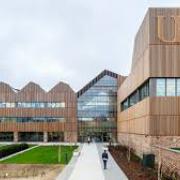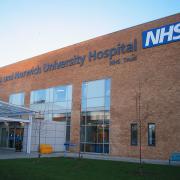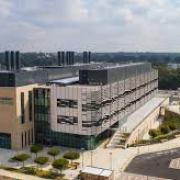Bedford Hospital
Bedford Hospital is a relatively small but very friendly DGH. It is an ideal place to learn the craft of surgery. Out trainees always find the senior staff very supportive and approachable. As there is less competition for surgical cases than in the larger hospitals, trainees have ample opportunity to get to theatre. Filling a log book is not usually a problem! There is also plenty of opportunity to attend OPD, where appropriate supervision is given. Trainees are actively encouraged to attend all regional teaching, and there is also good quality local training.
Our surveys show that in recent years the core trainees have been highly satisfied with their time at Bedford Hospital and would recommend it. And we enjoy having them!
Small to mid-size DGH
Serves a population of 270 000
Surgical Specialties:
- Regional centre for Vascular Surgery (Bedford, Milton Keynes, Luton)
- General Surgery: UGI, Colo-rectal, Breast
- Urology
- Orthopaedics (no spinal service)
- Plastic surgery
- ENT
Core Surgical Training:
We have four General Surgical Core Trainees (CT 1 and CT 2). Each spends six months in vascular, colo-rectal, UGI/Breast and urology.
On call is done on the Junior clinical fellow rota. This is shared between general surgery, orthopaedics and urology, and all 3 specialties are covered after hours.
Senior cover is provided by ST3 or above.
In hours work is done in the specific specialty.
Travel:
The hospital is a 10 minute walk from Bedford train station. There are fast train services in to London.
By car it is midway between the M1 jn 13 and the A1. It lies on the A6.
Direct trains to Luton airport and Gatwick.
What our trainees say about us:
“As a core surgical trainee at Bedford, I feel that I have developed a solid foundation of essential skills in the emergency and elective setting. There is good access to theatres with training opportunities from consultants and registrars. I have felt very supported by senior colleagues during my placements, and I am encouraged to attend theatres and clinics at every opportunity.”
“Lots of opportunities to attend theatre with keen trainers”
“Friendly hospital, helpful nursing staff, induction was well organised.HR also very helpful”
Mr Phillip Edge
Orthopaedic Surgeon, Bedford Hospital
James Paget University Hospital NHS Trust
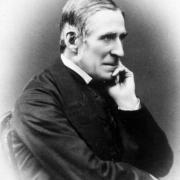
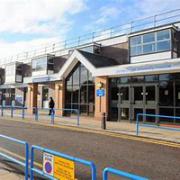
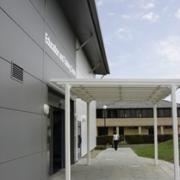
Top reasons to train with us at the James Paget University Hospital:
- We are a hospital that looks after our core trainees with a time-table designed to fit in their training needs.
- Has a large and varied work load of basic surgery and hernia work load required for basic junior surgical trainees, including laparoscopic surgery
- Has a state of the art Day Case Centre – where surgical activities are not affected during winter pressures
- Emergency work load while on-call is busy with good operative exposure to all trainees
- Receives 1/3rd of Norwich Medical School students from the University of East Anglia (UEA) with great opportunity to be involved in designing and conducting teaching sessions
In addition we are surrounded by beautiful beaches and the Norfolk Broads is on our door step; traffic is fairly calm.
Background
The James Paget University Hospital is a District General Hospital serving a population of 230,000. The Hospital is named after Sir James Paget who was born and grew up in Great Yarmouth. All Staff are friendly and senior medical staff is very supportive. The core surgical training programme offers training in General Surgery – including sub specialities, orthopaedics and otolaryngology. Despite challenges with rota patterns and the new contract, the rota has been redesigned and SMART criteria for core trainees are well met.
The Hospital has been the originator of 2 award winning e learning programmes (Mastership in Oncoplastic Breast, Colorectal and Regional Anaesthesia) and Health Education England Emergency Surgery ST3 pilot. The consultants hold laparoscopic training courses on site and an anatomy course at UEA. Most consultants are MRCS examiners and interview at the National Selection Process for Higher Surgical Trainees.
Hospital size
The Hospital has 500 beds.
Surgical Specialties
Orthopaedics, one core trainee,
ENT, one core trainee
General Surgery (Upper GI, Colorectal and Breast each one core trainee)
Rotations
Core trainee 1 – 2 posts, CT2 - 3 posts
Travel information
There is a regular bus and train service to and from Norwich. The Hospital lies just next to A12 and approached via the A47 & A12.
Teaching
There is weekly Wednesday a.m, teaching for the General Surgery department running across several themes including journal club, interesting case review, current best practice and research & audit. Also, 2 weekly lunchtime core surgical training teaching on Wednesdays. Core trainees have the opportunity to attend all training days held at the Deanery. Grand rounds are held weekly on Thursday lunch times. There is a monthly educational half day for surgical department.
Research and innovation
The colorectal and general surgery department has been recruiting patients in many national cancer and non-cancer trials. The trainees have opportunities to conduct various audits, research and quality improvement projects.
Typical timetables
General Surgery core trainees have a dedicated time-table to ensure that they have 2 clinics and 4 operating sessions each week. To maximize training opportunities during day time hours the on-call has been designed to ensure core trainee training needs are protected including maximizing training during day times.
Training facilities
A dedicated purpose built Education and Training Centre with seminar rooms, clinical skills training room, wet lab room, simulation suite and a Laparoscopic simulation room
A Separate library with 15 study spaces, access to a wide variety of books and online journals and point of care resources including, BMJ best Practice and Up-To-Date.
24 hour library access
Junior Doctors Mess
The Doctor’s Mess is located in the centre of the hospital and the Mess Committee organizes a variety of social activities.
Meet the Surgical Tutor
Kamal Aryal
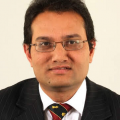
I was appointed as a Consultant Colorectal and General Surgeon following completion of my training in North West of England and post CCT fellowship in Lap colorectal Surgery in Dundee in 2011. I have been Educational Supervisor since my appointment and Surgical Tutor since 2014. I have interest in medical education and to this effect I am towards completion of Masters in Medical Education with dissertation on ‘Work Based assessments in higher general surgical training programme – trainer and trainee views and way for improvement.’ I am MRCS Examiner, member of faculty of surgical trainers, panel member for core and higher surgical training national selection interviews. I am lead for MCh Coloproctology University of East Anglia Course.
I have conducted 3 laparoscopic courses and one NOTSS courses at James Paget hospital for trainees from the East of England. I have helped trainees to design and conduct several courses for medical students and trainees including ‘surgical skills for future surgeons’ at the James Paget.
Outside of work I am a keen hill walker. I spend much of my time in charity work relating to health education to general population and training and teaching in laparoscopic surgery and non-technical skills in the third world.
Norfolk and Norwich University Hospital
Top reasons to train with us:
- We are invested hugely in training . We organise and run the regional teaching program and run regular faculty development meetings
- Engaged trainers practising latest surgical techniques with state of the art equipment. We are an IST (Improving Surgical Training) pilot site.
- Large volumes of elective and emergency surgery
- Simulation room on site with further simulation facilities at University of East Anglia (UEA)
- Research active trust with close links to UEA
- Norwich is a fine city and offers the perfect balance of historic city life with delightful independent shops, coffee shops and restaurants and a vibrant arts scene. The surrounding Norfolk countryside is stunning with broads and beaches. A great place to bring up a family too.
Background
The original Norfolk and Norwich Hospital was founded in the 1700s and later became the University Hospital (NNUH), a teaching hospital for Nurses, Doctors, Midwives, Operating Department Practitioners and Therapists linked with the University of East Anglia. Today the NNUH is one of the largest teaching hospitals in the country. The hospital moved to its current purpose built location in 2001, a state of the art building with over 1,200 beds. The NNUH provides care to the surrounding population of approximately 825,000 with approximately 90,000 inpatients and 700,000 outpatients being treated each year. Recent expansions have included the Bob Champion Research and Education Centre, housing the postgraduate centre (NANIME), medical school facilities and some health science related University of East Anglia laboratories. This joint capability emphasizes the trusts focus on education and research. The Quadram Centre opened in 2019 and is Europes largest endoscopy centre housing clinical services alongside state of the art research facilities for food and gut health.
There are a wide range of busy surgical specialties on site including; General Surgery, Vascular Surgery, Urology, Plastic Surgery, ENT, Thoracic Surgery, Orthopaedics and Paediatric Surgery.
There are currently 14 Core Surgical Trainees at the NNUH in all of the aforementioned specialties including the High Dependency Unit.
Teaching
As well as a comprehensive induction programme, core surgical trainees at Norfolk and Norwich benefit from regular departmental teaching opportunities. There is flexibility between departments to allow trainees to attend teaching outside their working department according to their career intentions and learning needs. The regional core surgical training programme is based in Norwich with its simulation suite opening in 2018.
Research and innovation
Many of the surgical departments at NNUH have an international reputation for research or innovation with many collaborations between basic sciences at UEA and NNUH and large numbers of multicenter trials occurring at the trust. The orthopaedic unit participates in many large scale trials as well as being involved in sift tissue biology and microbiology research. The general surgery and urology teams are amongst the pioneers of robot assisted surgery.
Typical timetables
All surgical departments at NNUH design their rotas to ensure that trainees have adequate time for education, in clinics, theatres and multidisciplinary meetings. We were selected to be one of the general surgery Improving Surgical Training pilot sites and look forward to welcoming IST trauma and orthopaedics trainees form 2020.
Training facilities
24 hour library access
Simulation room onsite – open access in office hours
Simulation suite at Centrum UEA
Video links from operating theatres to lecture theatre
Meet the surgical tutors
Claire Edwards
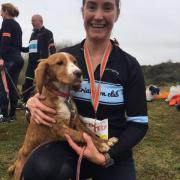
I was appointed as an orthopaedic consultant with a special interest in hand surgery in 2010. I have been an assigned educational supervisor since I started and was appointed to be the College Tutor and Director of Medical Education for Core Surgery in the region in 2018.
I trained in the East Midlands and completed a PhD part way through training. I am still very research active and sit on a number of committees including the T+O ST3 selection design group, the BSSH hand trauma committee and the RCSEd research and awards committee. I chair the RCSEd T+O Surgical Specialty Board and am a member of the Faculty of Surgical Trainers.
Despite being a northerner I love living in Norfolk – the combination of outdoor lifestyle and cultural activities suit me well. Outside of work I am a keen triathlete and have an amazing family with 2 young children and an expanding population of pets.
Watford Hospital Guide
Watford General Hospital is a 521-bed acute District General Hospital situated on Vicarage Road, Watford, Hertfordshire. Watford General Hospital is a 521-bed acute District General Hospital situated on Vicarage Road, Watford, Hertfordshire and is split between 3 sites: Watford, St Albans and Hemel Hempstead.
St Albans City Hospital is the Trust’s elective care centre. It provides a wide range of elective care (both inpatient low risk surgery and day-case) and a wide range of outpatient and diagnostic services with in excess of 70,000 outpatient appointments. It has 40 beds and 6 theatres.
The surgical department boasts 14 General Surgery Consultants, 16 Orthopaedic consultants and 4 Urology consultants. There is a weekly bleep-free (and catered) surgical programme for juniors on Thursdays.
A state-of-the-art simulation suite costing £300,000 has just been opened at Watford general Hospital. The suite replicates an acute care environment and provides realistic training by enabling staff to take part in simulated scenarios, and includes a fully functional “Sim Man” with which all junior doctors complete mandatory simulation training.
West Suffolk Hospital
The West Suffolk Hospital is situated in the beautiful market town of Bury St Edmunds. It is a town of rich and fascinating heritage with stunning medieval architecture, elegant Georgian squares and a world famous Cathedral and Abbey Gardens. With prestigious shopping, thriving arts and entertainment scene and a huge variety of fabulous restaurants and bars it provides for every taste and requirement to enable you to recharge and relax when not at work.
The hospital is approximately 1 hour 45 minute drive from central London, with rail links to both Kings Cross and Liverpool Street with journey times of just over 2 hours. The cycle route from the station takes approximately 15 minutes and there is safe cycle parking and plenty of staff car parking on site. Accommodation can be arranged on site if desired.
The hospital is a 430 bed DGH, with a catchment area of 600 square miles and serves a population of 280,000. It has consistently been named as one of the country’s top hospitals for providing safe, effective and high quality care and received the best CQC report of all hospitals in the region after the last inspection in 2016. We are an associate teaching hospital of the University of Cambridge.
Within the Surgery department we currently offer Core Training posts in General Surgery and Urology, but can be flexible and offer alternate posts in Trauma & Orthopaedics or ENT if desired. At present our CTs spend 6 months in both Urology and General Surgery, and are supported by enthusiastic Assigned Educational Supervisors and College Tutor to make sure that all training needs are being met, and careers guidance is being given. Our recent CT trainees far exceeded their operative number and WBA requirements. There is an active teaching programme within the Surgery department and also from the Post Graduate Medical Education Centre which also houses a state of the art simulation centre.
We look forward to welcoming you to our busy, friendly hospital.
Miss Lora Young
Orthopaedic Surgeon, West Suffolk Hospital
West Suffolk Hospital Recommendation:
Hi there, my name is Abi Kanthabalan. I was a Core Surgical Trainee at West Suffolk Hospital for my CT2 year. I did 6 months of General Surgery and 6 months of Urology. West Suffolk is a fantastic hospital and I have learnt so much here. As part of this rotation I was on-call Registrar in both specialties and this is where I feel improved my clinical skills the most. I would review emergency patients where I had to make decisions on which patients required emergency theatre, the appropriate scan according to clinical need, prioritizing patients for clinical review, leading and teaching junior doctors and medical students on surgical and urological emergencies and learning key laparoscopic and endoscopic skills. During my normal hours, I attended both main theatre and Day Surgery Unit where I was often first assistant or primary surgeon working with registrar or consultant. In General Surgery, I had exposure to inguinal and para-umbilical hernias, laparoscopic appendicectomy and cholecystectomy, exploratory laparotomy, large and small bowel resection, stoma formation, de-roofing of liver cysts and Nissen’s fundoplication. During my time in Urology I was exposed to ureteric stent insertion, percutaneous nephrolithotomy, bladder cancer resection, prostate resection and biopsy, testicular torsion, vasectomy, penile prosthesis implantation and Nesbit’s procedure. Consultants at West Suffolk are approachable and I was always able to ask for both clinical and academic advice. I was able to complete my surgical e-portfolio with more than required numbers of CBDs, DOPs and CEXs. As a result of my time in West Suffolk Hospital I feel I have become more competent as a surgical trainee and feel ready to take on responsibility of becoming a registrar.
Abi Kanthabalan
Core Surgical Trainee
West Suffolk Hospital
August 2016 – 2017
Colchester Hospital
Colchester Hospital is a District General Hospital Serving a population of 370 000. It has recently merged with Ipswich Hospital to form East Sussex & North East Essex Foundation Trust. However, trainees at an SHO level are not currently expected to cross cover between sites.
Colchester is an extremely friendly place to work, there are plenty of training opportunities and good senior support. The current core surgical trainees have found it easy to get their logbook numbers and to get sufficient numbers of workplace based assessments for ISCP. There is also senior support in developing projects for publication and presentation at conferences.
There are opportunities to be involved in teaching at medical student and foundation doctor level. There are also surgical skills courses run at the hospital where you can be part of the faculty.
Surgical Specialties:
- ENT – 1 core trainee
- Breast Surgery – 1 core trainee
- Trauma and Orthopaedics – 1 core trainee
- Urology – 1 core trainee
- Vascular Surgery – 1 core trainee
- Colorectal – 1 core trainee
- Upper GI
Core Surgical Trainees:
There are 5 CT1 doctors and 1 CT2 doctor based at Colchester. On call patterns vary by specialty. At night, the SHOs cross cover specialties – one covering ENT and T&O; one covering general surgery, urology and vascular surgery. All specialties have senior cover by ST3 or above (aside from general surgery, they are NROC out of hours).
Teaching:
Fortnightly local teaching is organised on topics surrounding MRCS and delivered by consultants in the trust.
Travel:
The hospital is a 10-15-minute walk from Colchester Train Station and is on multiple bus routes.
Some trainees choose to live locally. Others commute from further afield with frequent, regular trains running from London Liverpool St to Colchester (50 minutes). Staff discount can give reduced fares for the train and bus.
There is staff parking at the hospital.
There is free rest accommodation available following night shifts if you are unable to travel home – this can be booked through switchboard.
Cambridge University Hospitals NHS Foundation Trust
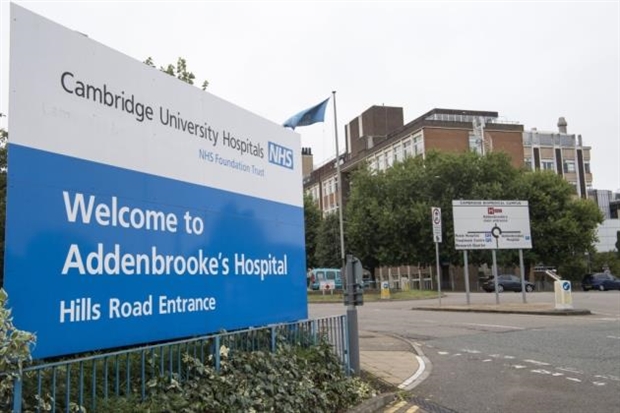
Hospital Guide for Core Surgical Training
5 Top reasons to train at Addenbrookes Hospital:
- University teaching hospital with a worldwide reputation.
- Dedicated local educational faculty for Core Surgical Training, welcoming trainee representation at regular faculty meetings
- The East of England’s Major Trauma Centre
- Dedicated Simulation Suite and state of the art Evelyn Cambridge Surgical Training Centre, providing unrivaled environment to learn and perfect skills and techniques on cadaveric material
- Less than 40 minutes from London and home of the famous University and punting on the river Cam. Cambridge is a compact cosmopolitan city with outstanding architecture old and new.
BACKGROUND
Cambridge University Hospitals NHS Foundation Trust (CUH) is a thriving, modern NHS hospital based in Cambridge, England.
The hospital fulfills a number of important functions. It is the local hospital for people living in the Cambridge area, it is a specialist centre for a regional, national and international population. It is the teaching hospital for the University of Cambridge, and it is a world-class centre for medical research.
CUH’s commitment as part of the wider health community is to re-examine, re-evaluate and explore new ways of working: with our partners in health services, social care, and the city; with each other as colleagues; and with patients and the public. The agenda for modernisation drives this commitment; modernisation is not perceived as a separate issue, but rather as something that informs the whole structure, thinking and culture of the Trust.
Our commitment to our patients and our community is as an open, accountable and responsive organisation that fosters patient and public involvement, which we consider is crucial to the development of a modern hospital fit for the 21st century.
We pride ourselves on the teamwork, energy and commitment of our excellent staff – they are our most important assets. Recognising this, we have taken a positive approach to supporting them in their work through schemes to help work-life balance, improvements in the working environment and initiatives to make it easier for staff to explore new career opportunities and to develop professionally and personally.
CUH provides:
- accessible high-quality healthcare for local people
- specialist services for people in the East of England and beyond
- support for education and training in all healthcare staff, and a workplace where all staff have access to continuing learning and personal development
- support for research and development generating new knowledge, leading to improvements in population health and in healthcare delivery
- a contribution to economic growth, sustainable communities and a good quality of life for those we serve
Addenbrooke’s Hospital, part of Cambridge University Hospitals NHS Foundation Trust (CUH) provides emergency, surgical and medical services, and is a centre of excellence for specialist services for liver transplantation, neurosciences, renal services, bone and marrow transplantation, cleft lip and palate reconstruction, treatment of rare cancers, medical genetics and paediatrics. CUH also includes The Rosie Hospital, which provides a full range of women’s and maternity services.
Last year 62,171 men, women and children were treated as inpatients, 112,861 people attended accident and emergency, and there were 730,973 visits to outpatient clinics (2016 figures). CUH medical staff hold clinics in 14 different regional hospitals so that patients do not have to travel to Cambridge. Nearly 100 of our Consultants hold some form of joint appointment with a dozen neighboring hospitals.
CUH has:
- Around 7500 staff
- An income of around £700 million per annum
- Around 1,000 beds
- Five intensive care units
- 37 Operating theatres
TEACHING
CUH is a teaching hospital for medical undergraduates and postgraduates, nurses and students in other clinical professions and has a variety of initiatives to encourage life-long learning’. Many training schemes are in place in our National Vocational Qualification Centre, Postgraduate Medical Education Centre and Learning Centre.
As well as a dedicated Assigned Educational Supervisor, a dedicated Local Educational Faculty supports core surgical trainees. This faculty meet regularly throughout the year to recognise and learn from those excellent training opportunities, as well as addressing issues affecting the high-quality training we aspire to provide.
RESEARCH & INNOVATION
CUH is also working in partnership with the University and their research partners (the MRC and CRUK) to make The Cambridge Biomedical Campus an internationally leading centre for biomedical and translational research.
The hospital already shares its site with a range of other organisations including the University Clinical School, the National Blood Authority, and laboratories funded by the Medical Research Council (MRC), the Wellcome Trust and Glaxo SmithKline, University of Cambridge Hutchison/Cancer Research UK (CRUK) Cancer Centre. The most recent addition is state-of-the-art Papworth Hospital that relocated in 2019. Building is currently underway on a new global R&D Centre and Corporate HQ for AstraZeneca.
EDUCATIONAL FACILITIES
Complimenting the plentiful clinical training opportunities that CUH presents for core trainees, the Cambridge Postgraduate Medical Centre and Cambridge University Health Partners (CUHP) provide unrivaled educational opportunities;
The Postgraduate Medical Centre
The Postgraduate Medical Centre provides the infrastructure and support to facilitate the education, training and continuing development of all healthcare professionals.
The Cambridge University Hospitals Simulation Centre
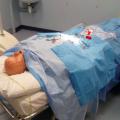
The Simulation Centre is a development that allows multi-professional and inter-disciplinary learning on machines that simulate a wide variety of very realistic medical scenarios.
Our aim is to improve patient safety through teaching and training, with research methods being developed to provide us with tools to reduce clinical error.
The Evelyn Cambridge Surgical Training Centre
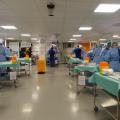
The Evelyn Cambridge Surgical Training Centre is a state of the art facility providing advanced education to the medical profession and other clinicians across the world.
The Centre provides the best possible environment for surgeons to learn and perfect their techniques on cadaveric material, while also offering world-class training in minimally invasive, microsurgical, and open surgery.
E-Learning
The PGMC together with CUHP has developed an e-learning resource for all staff to provide accessible continuing professional development training. In due course, we aspire to provide a comprehensive set of programmes that will contribute to a broader range of clinical, quality and safety, and regulatory priorities.
The University of Cambridge Clinical School
For those core trainees with a passion for education and developing their own teaching skills, as the main site for the University of Cambridge Clinical School CUH presents excellent opportunities to teach undergraduates in both ward based and seminar teachings.
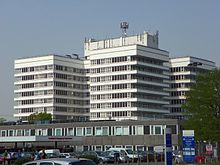
Top reasons to train at Lister Hospital, ENHT:
- Excellent track record of CST obtaining HST posts in desired regions.
- Broad range of surgical specialties enabling CSTs greater flexibility in changing their rotations (with TPD permission) to suit the changing interests of the CST !
- Large volume of surgery – plenty of opportunity to fill your log book, and to gain exposure in surgical areas unfamiliar to the CST.
- Friendly atmosphere with approachable consultants.
- Currently training both CSTs and ISTs.
Background
The Lister Hospital (part of the East and North Herts NHS Trust) is a large DGH (730 beds), located just off the A1, in Stevenage. It serves a population of around 600,000. In 2015, all inpatient activity was moved across from Welwyn Garden City to the Lister Hospital, and a new QEII hospital was built. By Train, Stevenage is 20 mins from Kings Cross and 40 mins from Cambridge.
The Lister Hospital has a 24/7 primary percutaneous coronary intervention service and a hyper-acute stroke service. The hospital has around 20 operating theatres and has 3 ITUs that can accommodate >20 patients (16 level 3 and 6 level 2). The site is a level 2 trauma centre. The Interventional Radiology Service is currently undergoing expansion with the intention of providing a 7 day service. The Trust has a good training success rate with 50-70% of CTs going straight into a HST post after CT2 in recent years.
The LH has 14 CSTs.
In 2019, 3 of the CT posts have been changed to IST posts (General surgery x 2 , Urology x1)
Specialties:
ENT
6 dynamic consultants all with their own special interests. CTs spend more time in theatre than GPVTS in order to gain their surgical proficiencies. On calls cover ENT patients only. An ear simulator is available at all times for training.
Plastic Surgery
Covers a sub-regional catchment population, comprising a large area of Hertfordshire and Bedfordshire (approx. 800,000). The busy department has a workload that is approximately 70% elective surgery.
There are 8 consultants and 1 SAS doctor. The core strengths of the Department include: skin cancer services (hosting the region’s Specialist Skin Cancer Multi-disciplinary Team), breast reconstruction (immediate and delayed breast reconstruction as well as aesthetic breast surgery), hand surgery (elective and emergency) and paediatric plastic surgery. Approximately 3 all day plastic surgery theatre lists run each weekday.
General Surgery
9 consultants. Undertakes around 250 cholecystectomies and >150 major colonic cancer resections (open + lap) per year.
Breast Surgery – 3 consultants. Around 500 breast procedures performed per year and offers immediate reconstruction where applicable.
Vascular Surgery
4 consultants. Around 40 carotid procedures, 40 AAA (open and EVAR), 40 leg bypasses and 200 AV fistula procedures currently performed per year. This department has recently been granted permission to expand to become the Vascular Hub for Hertfordshire and West Essex. With this expansion, the vascular workload is expected to double, along with the consultant numbers. Design for a hybrid theatre began in 2018.
Trauma & Orthopaedics
16 consultants. Dynamic and busy trauma and elective unit. >600 joint replacements including shoulder and ankle, 500 NOFs, >100 revisions. Suitable for a keen trainee who wants to gain further experience especially in trauma. Approximately 4 all day orthopaedic lists run each weekday.
Urology
8 consultants. Busy mix of general urology and specialist Urology Robotic cancer (for over a decade) offering partial nephrectomy, prostatectomy and cystectomy. Also offers laparoscopic nephrectomy, valuable paediatric Urology exposure, complex stone management and reconstructive procedures for incontinence. It is the main centre for urological cancers in Hertfordshire.
Research and innovation
There are close links with the School of Life and Medical Sciences, University of Hertfordshire. Renal Medicine (and thus vascular surgery) and Urology in particular have good recent records. Audits and research projects are strongly encouraged. Numerous opportunities to present work is available.
Timetables
Departments have on-call frequencies that vary between 1 in 7 and 1 in 10. CSTs are on site when on call. Timetables give a preference to CSTs to attend the most suitable training opportunities.
Training facilities
24hrs library access
Simulation training available in Lister Education Centre
Surgical skills training room (in main theatre block) is accessible 24hrs a day.
‘Animal tissue’ workshops are run in the Lister Education Centre.
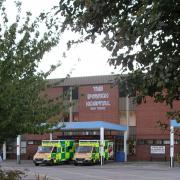
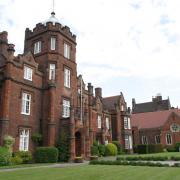
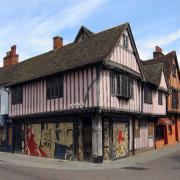

Ipswich Hospital is a great place to train
- Large general hospital which provides an excellent grounding in core surgical skills
- The hospital has around 650 beds and serves around 385,000 people from Ipswich and East Suffolk
- On 1 July 2018 The Ipswich Hospital NHS Trust merged with Colchester Hospital University NHS Foundation Trust to form the East Suffolk and North Essex NHS Foundation Trust (ESNEFT). At present the two hospitals remain separate clinically and Core Surgical Trainees are not expected to cover across the two sites
- Enthusiastic, friendly and supportive senior clinicians
- There are Core Surgical Training posts in General Surgery, Urology and Trauma & Orthopaedics. All posts have timetables that fulfil the SMART criteria with ample opportunity to train in theatre and outpatient clinics.
- Ipswich is a popular place to live and work.
Ipswich & East Suffolk
- Ipswich is the county town of Suffolk and the oldest continuously inhabited town in England.
- Ipswich often appears in surveys as one of the most desirable and affordable places to live and work.
- There are many good state and independent schools in Suffolk. Ipswich School is the only school mentioned by Shakespeare (in Henry VIII).
- Ipswich was a major port in Middle Ages and the regenerated port is now a vibrant and picturesque waterfront with many fine restaurants and bars. The waterfront is also home to one of the UK's newest universities, the University of Suffolk.
- Ipswich Town Football Club has been managed by England’s two most successful managers, Alf Ramsey and Bobby Robson.
- Suffolk is the country’s warmest and driest county and is home to beautiful countryside, including the Suffolk Coast and Heaths (a designated Area of Outstanding Natural Beauty), "Constable Country” and the popular towns of Woodbridge, Aldeburgh and Southwold.
- Good road and rail links to London (typically a 70-minute train journey to London Liverpool Street).
Meet the trainer - Chris Servant
I have been a Consultant Orthopaedic Surgeon in Ipswich, with an interest in knees surgery and sports injuries, since February 2004. I have been heavily involved in medical education for many years. I am a member of the national Project Steering Group for Core Surgical Training Recruitment and I am the chair of the East of England Core Surgical Training Committee. Previously I was the deputy Training Programme Director for Core Surgical Training. I am also a University of Cambridge Senior Clinical Tutor and an examiner for the Intercollegiate Specialty Examination in Trauma & Orthopaedic Surgery.
I have an interest in evidence-based medicine and I am on the Editorial Board of two orthopaedic journals: the Bone & Joint Journal and the Arthroscopy journal.
I am married to an Emergency Medicine Consultant and have two school-age children. My interests outside of work are mainly sporting, including running, cycling, triathlon, rugby coaching and snowboarding.
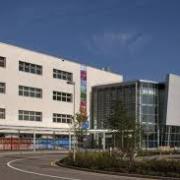
Broomfield Hospital
Core training positions in general surgery, urology, plastics and ENT.
Mid Essex Hospital Services, which was established as an NHS Trust in 1992, has an annual turnover of £261m and employs approx 4,400 staff. It provides local elective and emergency services to 380,000 people living in and around the districts of Chelmsford, Maldon and Braintree (including Witham). The Trust also provides a regional wide plastics, head and neck and Upper GI surgical service to a population of 3.4 million and a supra regional burns service to a population of 9.8 million.
The facilities at the hospital include three integrated laparoscopic theatres as well as robotic surgical facility. There is access to a skills lab and library.
Located in the City of Chelmsford, with all major road connections, frequent mainline rail services to and from London and a major airport at Stansted just 40 minutes away, the Trust is in an ideal location for commuting.
In November 2010 the Trust opened a brand new PFI funded hospital wing which enabled the organisation to centralise the majority of its clinical services onto the Broomfield Hospital site.
Duties of the Core Post
Your duties will be arranged with the Consultant to whom you are responsible, who has final medical responsibility for all patients under his/her care. Any clinical problems beyond your experience or problems causing anxiety should be referred to the Consultant or a more senior member of your team.
Day to day duties include:
Performing Operations and Assisting in Theatres
Seeing patients in Out Patient Clinics
Responsibility for continuity of care for patients on the ward
Examining and making management plans with on call consultant of all admissions when on duty
Attending ward rounds
It is the doctor’s responsibility to ensure that they take natural breaks as required under New Deal and EWTD and to keep to rostered hours of work.
Participation in audit/research
Participation in teaching
Department of Colorectal and Upper Gastrointestinal Surgery
The department of Upper GI Surgery is the regional cancer center performing around 120 resections a year. The unit performs all aspects of the management of oesophageal cancer, minimally invasive oesophagectomies and gastrectomies as well as benign and functional upper GI surgery.
The colorectal department at Broomfield Hospital undertakes a wide range of elective colorectal surgery, including minimally invasive surgery for colorectal cancer, inflammatory bowel disease, pelvic floor pathology and anorectal conditions. We perform robotic cancer and pelvic floor surgery. We have a JAG accredited endoscopy department. There is a full outpatient colorectal service, including streamlined services for rapid diagnosis in suspected cancer and a unique remote surveillance programme for the follow-up of cancer patients.
The GI unit also runs an advanced abdominal wall reconstruction service (in combination with plastic surgical colleagues). There is therefore a constant stream of major surgery being undertaken, with the obvious training opportunities which accompany such a workload.
We have two associate specialist surgeons who provide weekly daycase lists which are ideal for core trainees including hernia repair, pilonidal disease, lumps/bumps, lap cholecystectomy. In addition Mr Adeosun offers a wound management clinic and advanced abdominal vac dressing service which is a valuable learning opportunity.
Elective opportunities include hernia repair, port insertion, ileostomy reversal and laparoscopic cholecystectomy in addition to exposure to more complex surgery.
Emergency service is separated from elective services with a daily consultant led ward round and operating list. The emergency take is busy and the core trainee covers both general, urological and vascular emergencies. There is a wealth of emergency operating and the core trainee should become proficient in diagnostic laparoscopy/appendicectomy, abscess drainage and opening/closing laparotomy wounds over a years placement with us.
There is weekly colorectal and UGI mdt, a monthly departmental morbidity and mortality meeting, combined with audit and educational presentation and a weekly journal club.
Department of Urology
The urology department offers a wide variety of experience, from minor procedures such as flexible cystoscopy and circumcision to minimally invasive adrenal surgery and nephrectomy. The core trainee is encouraged to attend the emergency theatre weekly to maintain general surgical emergency skills. There is a urology registrar on call 24/7. There is a renal stone service. The department holds a weekly grand round which is used for teaching, weekly MDT and monthly audit.
The core trainee is encouraged to attend clinics and MDT. Particular opportunities include complex catheterisation, flexible cystoscopy, minor procedures as well exposure to more complex pathology.
The rota is 1:10 full shift.
All trainees are encouraged to participate in audit and teaching and opportunities for management roles such as FY1 mentorship, rota coordination and involvement in induction are provided.
Rotation Guide: Core Surgical Training – Plastics
The Plastic Surgery Unit based at Broomfield hospital, otherwise known as the St Andrew’s Centre for Plastic Surgery and Burns, is the largest plastic surgery unit in the country. The St Andrew’s name carries with it an internationally recognised reputation for excellence and is considered one of the best centres for Plastics training in the UK. Those placed at St Andrew’s can experience the full breadth of our specialty from burns, to trauma, to complex reconstruction.
There is plenty to gain as a core trainee in the unit, even if you do not intend to continue Plastics at ST3. You can aim to improve your general operating skills and soft tissue handling in our minor ops and trauma theatres; you can participate in academic work, with a number of projects running at any one time; and you can link Plastics themes with many other related specialties such as ENT, Orthopaedics, Vascular and Maxillo-Facial Surgery.
For those considering applying for a Plastic Surgery training number, there is ample opportunity to gain operating experience in skin cancer, hand trauma and burns – the three domains assessed at the ST3 interview. Working in a large unit with a variety of cases will also allow you to become a confident, capable registrar, which ultimately we aim to help you achieve.
Broomfield
Broomfield hospital is based 3 miles north of Chelmsford, Essex and serves a population of 380,000, employing 4,400 staff. The hospital falls within the Mid Essex Hospitals Trust, which serves the populations of Chelmsford, Maldon and Braintree (including Witham). The supra-regional burns centre within St Andrew’s serves a population of 9.8 million and covers most of the East of England. The nearest burns centres are at Chelsea and Westminster and Birmingham.
St Andrew’s is viewed as a ‘hospital within a hospital’ and is therefore fairly self-contained. Most of its components, including its operating theatres, lie within the same block.
Specialist areas
Many consultants working at St Andrew’s have specialist responsibilities not seen in other plastics departments. These include:
Burns
Breast reconstruction
Head and neck reconstruction
Facial palsy
Skin malignancy
Microsurgery
Lower limb reconstruction
Lymphoedema
Hand surgery
Trauma
Cleft lip and palate
Hypospadias
Vascular anomalies
Oculoplastics
Laser therapies
Duties / Shift types
The junior grade (SHO) rota includes training FY2, CT1 and CT2 grades alongside non-training Junior Clinical Fellow doctors. Its is a rolling rota over 12 weeks that includes 1:4 weekends. Generally there are 5 types of shift:
Day Shift: 0730-1700
Most commonly, this is a ward-based shift to look after the elective patients. This will allow you to become experienced in peri-operative medicine and flap monitoring for our complex reconstruction patients. These patients are generally based across 2 wards, Stock and Mayflower.
With good communication and teamwork, the SHO’s on the ward can often clear the jobs and attend sessions in theatre and clinic. The unit has also recently begun to hire advanced practitioners, allowing trainee surgeons to gain valuable experience in other areas of the unit. For those who are interested, the team who design the rota are open to suggestions and requests for you to be placed in theatre/clinics, especially if the ward has enough SHO’s allocated to it that week.
Trauma On-Call: 0730-2000
The ‘Trauma SHO’ bleep holder looks after the trauma patients, who are generally based on mayflower ward. The SHO joins the trauma ward round in the morning and carries out the jobs afterward. Once the jobs are completed, the trauma SHO is expected to join the registrars in the hand trauma clinic. This is a busy clinic with plenty of opportunity to become comfortable in managing simple nailbed injuries to triaging amputated digits. The trauma patient cohort is generally made up of patients with hand injuries, but can also include patients with wound complications, necrotising soft tissue infections and bite injuries. During the day, the nurses on our dedicated hand unit take referrals for trauma and will run any queries by either yourself, or the registrar.
Burns On-Call: 0700-1900
The ‘Burns SHO’ bleep holder undertakes the ward round of all the ward burns patients (not those on burns ICU/BICU) and presents them to the burns surgeons, anaesthetists and other specialist auxiliary staff such as pharmacists, dieticians and physiotherapists. They then carry out the jobs and review new referrals to our burns outpatients department. The nurses on the burns unit take all the burns referrals and generally discuss cases with the burns registrar. You will have the opportunity to take part in burns resuscitation and burns surgery in our dedicated operating theatre on the burns unit.
Burns Short-Day: 0700-1300
To assist the ‘Burns SHO’.
Night On-Call: 1945-0745
Only one SHO is required overnight, therefore the ‘Night SHO’ covers elective, trauma and burns patients. The trauma referrals now come to you, but most plastics patients can be seen on an outpatient basis, and can be booked into hand clinic in the following days. Reserve your time for the true emergencies such as major burns, digital amputations and necrotising fasciitis. In terms of support overnight, there is a junior registrar covering Burns and a senior registrar covering General Plastics. The Night SHO assists the registrars on a ‘flap round’ to check the condition of all the free flaps on the wards. Then in the morning you assists the ‘Trauma SHO’ on the trauma round.
Alongside these shift types are opportunities in research, audit and teaching. Te unit sees students from the newly formed Anglia Ruskin medical school, which comes complete with state of the art facilities including a dissection lab using Thiel embalming methods.
Whilst St Andrew’s is a busy unit, the key benefits of this rotation include:
- Wide breadth of plastics cases including general and specialist areas such as vascular anomalies
- Internationally renowned burns centre with burns ICU and dedicated operating theatre
- Good opportunities for operating experience including minor ops skin cancer cases and trauma theatre that commonly runs until 10pm!
- Excellent specialist auxillary support staff, including hand therapists, specialist nurses, clinical psychologists, etc.
- Plenty of senior support
Due to its size and role in the care of the East of England population, the St Andrew’s Centre for Plastic Surgery and Burns is an exciting place to work. It allows you the opportunity to work alongside world-class consultants who are keen to see trainees progress. For further information please visit https://www.meht.nhs.uk/services/st-andrews-centre-plastic-surgery-and-burns/
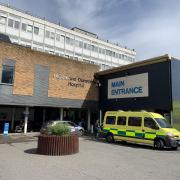
Luton & Dunstable University Hospital
By William Wakeford, Olivia Kenyon
& Mr Rishi Talwar, College Surgical Tutor
Top reasons to train at Luton Hospital
- Large volume of surgery – plenty of opportunity to gain surgical experience and fill logbooks
- Specialist services in Head and neck cancer, OMFS and Bariatric surgery
- Friendly atmosphere with approachable consultants
Background
Luton & Dunstable University Hospital (now part of Bedfordshire Hospitals NHS Foundation Trust) is a large DGH (695 beds), located next to junction 11 of the M1, making it easily accessible by car. It serves almost 400,000 people and employs approximately 3,400 staff. By train, Luton is 22 minutes to St. Pancreas International Station in London.
Facilities
Luton & Dunstable has 12 operating theatres with 17,000 operations performed per year and an ITU that can accommodate 23 patients (these capacities are increasing with the building of a new acute services block). It has the only Bariatric unit in the East of England deanery and is a popular rotation for general Surgical trainees, especially those with an interest in Upper GI. The hospital is a specialist centre for Maxillofacial Surgery and Head and Neck Cancer Surgery as well as providing a Urology One Stop Clinic. The ED is one of the busiest in the region and is proud of its high compliance with the 4 hour target. It is rated good by CQC with outstanding rated services of urgent and emergency care, Paediatrics, outpatients and diagnostics. Super Saturday operating lists have been implemented to help reduce waiting lists and increases operating opportunities for surgical trainees working on weekends.
The hospital has four main buildings: Medical block, Surgical block, St Mary’s wing (medicine) and Maternity. The area has populations with many different cultures, giving training and life a rich and interesting mix. The Trust is committed to delivering the best patient care with an emphasis on kindness and understanding from all of the staff.
Trainees have reported excellent support by enthusiastic Educational Supervisors and the College Tutor helping to ensure that all training needs are met and careers’ guidance is being given. Trainees are actively encouraged to attend all regional teaching and there is also good quality local training.
Specialties:
|
Surgical Specialties at L&D |
Core Surgical Trainee Positions |
|
Oral & Maxillofacial Surgery |
1 x CT1/2 |
|
ENT |
1 x CT1/2 |
|
General Surgery |
1 x CT1 |
|
Urology |
|
|
Breast Surgery |
|
|
Bariatric Surgery |
|
|
T&O |
Previous CT1/2, recently moved to OMFS |
Research and innovation
Audits and research projects are strongly encouraged. Numerous opportunities to present and publish work are available.
Teaching
L&D is a University teaching hospital for UCL medical students who are placed in most of the surgical specialties. In house teaching is provided by ENT, T&O and general Surgery to their juniors. OMFS run in-depth weekly Friday afternoon teaching alongside discussion of the week’s trauma admissions.
Training Facilities
Within COMET there is a large Lecture Hall with up-to-date audio-visual facilities, plus seven smaller well-equipped seminar rooms, a Multi-skills Laboratory, Simulation rooms and an IT suite. The library includes a well-equipped computer room and provides excellent access to journals and papers with enthusiastic staff keen to help with literature searches.
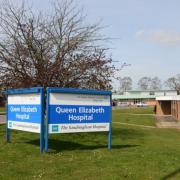
The Queen Elizabeth Hospital in King’s Lynn is a DGH which has 500 beds, 28 wards and serves a population of around 331,000 people who live in the three counties of Norfolk, Cambridgeshire and Lincolnshire. We deliver high standards of care for our patients and their families to include both an elective and emergency service. Alongside this, we play a leading role in research and innovation, being one of the most-research active NHS Trusts in the country compared to similar-sized hospitals.
The General Surgery team consists of 11 consultants; 2 upper GI, 5 colorectal, 2 breast and 2 generalists providing a breadth of experience for trainees. There is a dedicated Day Surgery unit consisting of four operating theatres providing further opportunities for training. QEH and the Surgical Department provide several teaching platforms for trainees which includes a two hour general hospital teaching session, an hour of surgical teaching each week and the availability of a suturing and hand tying workshop to improve basic skills before attending the operating theatre. This teaching is in conjunction with attendance and participation at the Surgical Department’s clinical governance and mortality and morbidity meetings held weekly. We also have an active audit department providing the opportunity and assistance to be involved in both local and national audits with a good track record within the Surgical Department of closing the loop.
Overall, the surgical team at QEH provide a friendly environment in which to train with supportive and approachable senior team members.
Basildon Hospital is part of the Mid and South Essex NHS Foundation Trust (Basildon, Broomfield and Southend Hospitals). Basildon Hospital is the arterial hub for the vascular network. Thoracoabdominal aortic surgery takes place at Basildon Hospital, due to the presence of both vascular and cardiothoracic surgery departments on site. Other vascular workload includes carotid, AAA, lower limb and renal access surgery. There is good endovascular teaching available.
Core trainees rotate through General, Orthopaedic and Vascular surgery. The hospital has close links with Anglia Ruskin University and its medical school. Excellent learning opportunities are available. The hospital is located on the outskirts of London.
